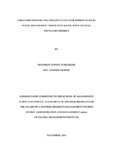| dc.contributor.author | Atwine, Mathew Tumushabe | |
| dc.date.accessioned | 2020-12-03T12:28:07Z | |
| dc.date.available | 2020-12-03T12:28:07Z | |
| dc.date.issued | 2014-11 | |
| dc.identifier.citation | Atwine, Mathew Tumushabe(2014)Urban Households’ Willingness to Pay for Improved Solid Waste Management Services in Kitwe Town Council, Ntungamo District | en_US |
| dc.identifier.uri | https://hdl.handle.net/20.500.12305/980 | |
| dc.description.abstract | This study investigated how the urban household‟s willingness influenced to pay for
improved solid waste services in Kitwe Town Council of Ntungamo district. The purpose of
this study was to assess the urban households‟ willingness to pay for improved solid waste
management services received and in Kitwe Town Council. The objectives of the study
included, to examine extent on how income levels, education levels, gender, quantity of solid
waste and maximum daily charges affected willingness to pay for improved solid waste
management services in KTC. The research employed multi stage sampling techniques to
select one hundred sixty four households, five primary schools‟ head teachers, two secondary
schools‟ head teachers, four eating houses‟ managers, two market tenderers, three medical
clinics in- charges, three grains milling machines/factories‟ managers and two bakery
managers from the study area. The Pearson Chi-square and linear ratio used estimated and
revealed that the income (P=0.002) education (P=0.018) and amount of maximum charges
paid (P=0.000) of the household head was significantly associated with the willingness to pay
for solid waste management services. Other variables of gender (P=0.090) and quantity of
solid waste generated (P=0.216) were not significantly associated with the willingness to pay
for improved solid waste management services. The study concluded that dimensions of
income levels, education levels and maximum charges paid influenced the willingness of
respondents to pay for improved solid waste management services. The study recommended
that Kitwe Town Council authorities should promote behavior change of mind set on
perception of being poor to afford user charges and back yard agriculture using manure from
solid waste in order to ensure minimization of solid waste generated by urban households.
The study recommended further study in other sister Town Councils within Ntungamo
district to produce comparable results. | en_US |
| dc.language.iso | en | en_US |
| dc.publisher | Uganda Management Institute | en_US |
| dc.subject | Urban Households’ Willingness | en_US |
| dc.subject | Pay | en_US |
| dc.subject | Improved Solid Waste Management Services | en_US |
| dc.title | Urban households’ willingness to pay for improved solid waste management services in Kitwe Town Council, Ntungamo District | en_US |
| dc.type | Thesis | en_US |

